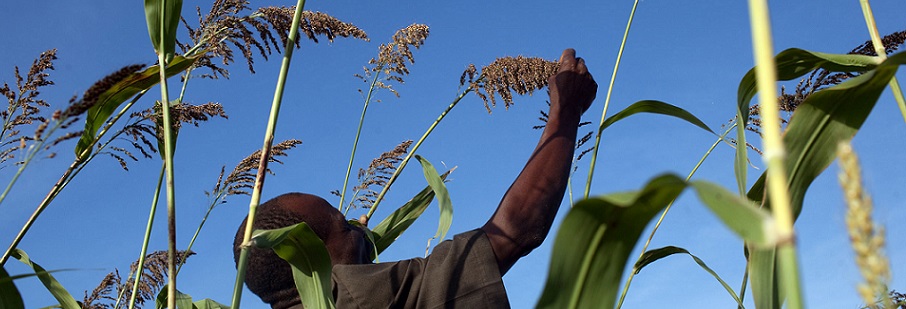تتناول هذه الصفحات الطاقة الأحيائية والمقاربة المتبعة من قبل المنظمة لضمان مساهمة الطاقة الأحيائية في تحقيق التنمية المستدامة. وترتبط هذه الصفحة بالموقع الخاص بالطاقة الأحيائية والأمن الغذائي الذي يتضمن تفاصيل عن عمل المنظمة لدعم البلدان من أجل تصميم سياسات واستراتيجيات للطاقة الأحيائية المستدامة وتطبيق تلك السياسات والاستراتيجيات، فضلاً عن أدوات مختلفة تعتمد عليها في عملها.
What is sustainable bioenergy?
Bioenergy is energy from biofuels. Biofuel is fuel produced directly or indirectly from biomass. Biomass is material of biological origin, for example wood, dung or charcoal and it excludes material embedded in geological formations and transformed to fossils.
The links between bioenergy and food security are complex. Making bioenergy development sustainable becomes even more challenging when trying to capture its potential benefits on rural development, climate and energy security. An integrated approach is required to address these links and promote both “food and fuel”, and ensure that bioenergy contributes to sustainable development. This approach requires:
- In-depth understanding of the situation and of the related opportunities, risks, synergies and trade-offs.
- An enabling policy and institutional environment, with sound and flexible policies and effective means to implement these.
- Implementation of good practices by investors and producers in order to reduce risks and increase opportunities; and appropriate policy instruments to promote these good practices.
- Proper impact monitoring, evaluation and response.
In order to promote this sound and integrated approach, FAO, in collaboration with partners, has developed the FAO Support Package to Decision-Making for Sustainable Bioenergy. This support package includes different elements which can be used independently or together at different stages within the decision making and monitoring processes of bioenergy development.

Bioenergy and Food Security (BEFS) Approach
Bioenergy and Food Security (BEFS) Approach
The Bioenergy and Food Security (BEFS) Approach supports countries in designing and implementing sustainable bioenergy policies and strategies tailored to the specific country context and needs. A core element of the BEFS Approach is the BEFS Assessment, which is country driven through multistakeholder dialogue and guidance. With a multidisciplinary and integrated set of tools and guidance, the BEFS Approach allows countries to use specific components of the BEFS Approach depending on the level of bioenergy development, and the status of bioenergy policy formulation and implementation. The BEFS approach has been applied widely across country realities and country contexts throughout the globe contributing to normative level assessments, reviews of bioenergy options and capacity building and development.
Global Bioenergy Partnership (GBEP) Bioenergy Sustainability Indicators
Global Bioenergy Partnership (GBEP) Bioenergy Sustainability Indicators
The GBEP Sustainability Indicators for Bioenergy are a set of 24 voluntary indicators to measure environmental, social and economic impacts of any type of bioenergy production and use at the national level . Agreed in 2011 by GBEP members (45 countries and 23 international organizations, including FAO), they provide a comprehensive and practical tool to guide sustainability assessments of bioenergy, with a view to informing decision making and facilitating the sustainable development of bioenergy.
The indicators have been implemented in sixteen countries. FAO measured them in Colombia, Indonesia, Paraguay and Viet Nam between 2011 and 2018, to monitor the sustainability of national bioenergy production and use, while also providing governments with policy recommendations. FAO has been organizing capacity development trainings and events on these indicators in several countries, and have used them as a reference for sustainability assessments in the context of some Horizon 2020 projects where FAO is a Partner.
Integrated Food-Energy Systems (IFES)
An Integrated Food-Energy System (IFES) is a diversified agricultural production farming system that incorporates agro-biodiversity and builds on the principles of sustainable production intensification. IFES can be small-scale operations managed at village/household level or large-scale operations designed for commercial activities. IFES can optimize land use through a combination of food and energy crops and/or optimize biomass use through its a cascading sequence to produce both food and energy. Depending on the circumstances, the generation of solar, thermal, geothermal, wind and/or hydro energy can be an integral part of the system.
FAO has developed an analytical framework to assess the sustainability and the possibility to replicate the IFES. This tool was used in Vietnam in 2015, and in Mozambique and Ghana in 2016-2017.

